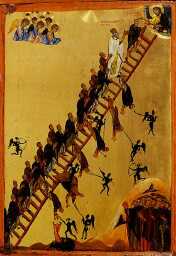By Fr. Nicholas Apostola
This is the fourth Sunday of Great Lent. We remember our father among the saints, John of Sinai who wrote the great spiritual work, The Ladder of Divine Ascent. We also continue to read from the Gospel of St. Mark. This week we hear the story of the healing of the epileptic boy (Mark 9:17-29). We read St. Matthew’s telling of the same miracle (Matthew 17:14-21) earlier in the cycle. (You may read those comments on the web site under: “This Week’s News,” August 17.) Here I would like to focus on two specific passages that I believe pertain directly to our struggle through Lent on our journey toward the Lord’s Pascha.
The miracle retold in this passage involves an epileptic boy whose father, while loving the boy deeply, is of rather limited faith. Hearing of Jesus, he brings the boy to the disciples to be healed. But they, lacking sufficient faith, were unable to help the boy. Finally, the boy is brought to Jesus himself. The Lord questions the faith of the father, and the father famously declares, “I believe; help my unbelief” (v. 24).
The three Synoptic Evangelists all accurately record that this miracle occurs after the Lord’s Transfiguration as he is going toward Jerusalem and his Crucifixion. Therefore, there are things that he says to both the boy’s father and to the disciples that reveal much about how Jesus himself understands the upcoming events.
When the boy’s father comes up to Jesus pleading with him to heal him, Jesus, speaking not only to the father but to the whole crowd, says: “You faithless generation, how much longer must I be among you? How much longer must I put up with you?” And then, having compassion on the boy, he says, “Bring him to me” (v. 19).
We can see how the lack of faith of both the “people” and even the disciples has tried and wearied the Lord. Moreover, from our vantage point, we can see that He clearly foresees his upcoming crucifixion and death and, in a sense, embraces it. He understands that he has taught and shown them all that they can absorb. If they do not understand now, they never will. This is an important, if somewhat painful, observation. When trying to teach someone a life-changing lesson we often think that the more we explain it, the easier it will be for them to understand. The truth is, as we see here, the lesson must be absorbed and internalized by the listener. There is very little that the teacher can do to facilitate that vital process. The Lord is telling all those within hearing distance that he has done and spoken all that he can. The rest is up to them.
The second verse I’d like to highlight is also very poignant for us during this Lenten period. When asked by the disciples why they could not cast out the spirit, the Lord says to them that “this kind can come out only through prayer and fasting” (v. 29). The Lord is giving us an insight into the nature of the spiritual struggle before us, and the tools we’ll need.
The Lord gave the disciples the power to cast out demons and heal sicknesses, but they had never really been put to the test. While I am sure they noticed that the Lord would withdraw into the desert for long periods of time to pray and fast, I am also sure they did not fully comprehend the necessity of this for the spiritual life.
When we take up the Christian life we enter into the “arena.” This is a spiritual spectacle that involves the Evil One and his allies. We often speak of the “demons of Lent” that attack us more ferociously as we take up the ascetic mantle more seriously during this time of year as we prepare ourselves to partake of the Light of the Lord’s Resurrection. We see in this Gospel account how even the disciples themselves were unaware of how much struggle and sacrifice it would take to do battle with the forces of darkness. We have the advantage of reading about it and being forewarned. However, this does not lessen the vehemence of the struggle.
Our comfort lies is this. Our Lord has taken up this struggle before us and for us. He tells us, “Come to me, all you that are weary and are carrying heavy burdens, and I will give you rest. Take my yoke upon you, and learn from me; for I am gentle and humble in heart, and you will find rest for your souls. For my yoke is easy, and my burden light.” (Matthew 17:28-30) This is the Lord’s true promise and a lesson for us. Let us pray for the wisdom to not only to receive it, but also to understand it.

